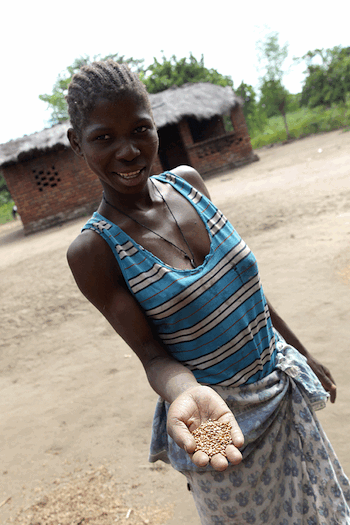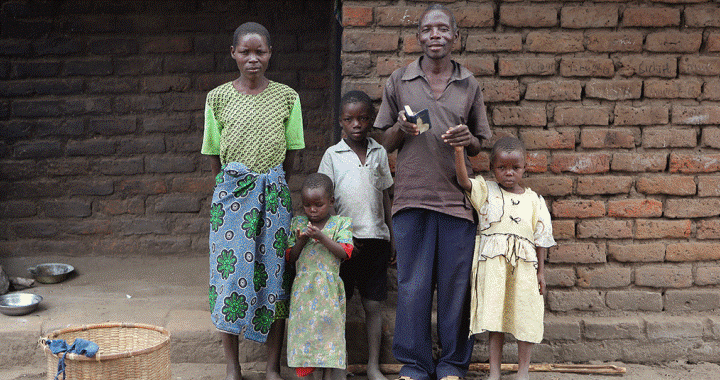This Mother’s Day will be the first one in fourteen years that I won’t be spending with my children. Assured by my kids that they could do without me on Mother’s Day–and quite convinced it is the case–I’ve spent the week in Malawi, learning from parents, here, about the challenges they face in providing for their children.
What I’ve learned has surprised me.
Mcuzi and her husband, Maxwell, welcomed several of us (visitors from the U.S.) to visit under the shade tree outside their small brick-built home. Like a few other moms I know, at home in Durham, North Carolina, Mcuzi was married in 1983. She and Maxwell, have seven children between the ages of three and twenty. Like everyone else in their village, they are farmers.
While we chatted, two of their young daughters, flopping across Mcuzi’s lap, the way bored children around the globe seem to do when their parents are talking to adults, bonked their little heads together. Like every mother I know, Mcuzi rubbed the tops of their heads as if to take the sting away. Like every child I know, the girls were visibly comforted by it.
Also by Margot : I’m Not A Fan of Hallmark Holidays
On this week that American mothers will be treated to crayon-drawn cards and pancakes-in-bed, Mcuzi’s face is filled with concern as she describes the difficulties facing parents in Malawi. What I find most compelling, what challenges the popular western myth of “poor, starving chronically-broken Africa” with which I’m familiar, is that–in Mcuzi’s village–it has not always been this way.
When Mcuzi was a child, the rains which nourished the maize fields came, like clockwork, every October. In fact, for decades local farmers could put seed into dry ground on October fifteenth, certain that the rains would come, water their fields and yield a rich harvest of maize. Vegetables and banana trees grew alongside the fish-filled river which flowed through the village.
Over the last several decades, though, villagers have experienced a change in the weather patterns. Over time, the rains began coming later and later, shortening the planting season. Droughts followed. Year after year, weather which was once predictable became no longer so. In fact, today, the riverbed that was once so plentiful, is simply a roadway of dry sand. When the rains come, it may flow for three or four days. Cruelly, it spills over its banks, flooding homes and taking lives. Then it is dry again. There are no fish. No vegetables. No bananas.
 While the west continues to disagree on the veracity of climate change, the citizens and government officials of Malawi no longer have this luxury. In fact, they compare the magnitude of the growing crisis in their country to HIV-AIDS. Together, communities are actively working together to mitigate the impact of the new unpredictable climate. Mcuzi’s village has received training from the government on conservation planting. The villagers have worked together to build a damn to keep the occasional river from flooding their homes. They’ve contributed their own money to plant walls of trees to contain the river in its banks. They’ve even changed the crops they grow.
While the west continues to disagree on the veracity of climate change, the citizens and government officials of Malawi no longer have this luxury. In fact, they compare the magnitude of the growing crisis in their country to HIV-AIDS. Together, communities are actively working together to mitigate the impact of the new unpredictable climate. Mcuzi’s village has received training from the government on conservation planting. The villagers have worked together to build a damn to keep the occasional river from flooding their homes. They’ve contributed their own money to plant walls of trees to contain the river in its banks. They’ve even changed the crops they grow.
Mcuzi explains, “We used to grow maize. Now we grow millet.”
Her husband, Maxwell, grabs a handful of millet and drops it into the hand of my colleague. He passes the millet to me. The grain feels like holding a handful of bee-bee shells or pebbles. The local food made with millet is called nsima.
Instinctively, I do that thing that people of privilege do. I rationalize. “My cocoa-puff-loving-kids wouldn’t touch this stuff!” I thought, “but I’m sure these hungry children are so grateful to have food”.
In fact, Mcuzi explains, they desperately miss the maize they once enjoyed.
She continues, “As a mother, it is difficult. The children don’t like it. I have to convince them it’s food.”
The blunt announcement is heartwrenching.
Also by Margot: Why I Think Jesus Would Bake a Cake for a Same-Sex Marriage
And it’s not even the case that there is enough bad-tasting food. Many days Mcuzi and Maxwell must choose between working their own fields–in the hopes of a later yield–and finding day-labor in fields belonging to others so that they can earn enough to buy one day’s food to feed their children’s hungry bellies. And still, there are days with no food at all.
When asked what message we might pass on to those we know, Maxwell doesn’t hesitate. “Tell them that, indeed, the climate has changed. And because of that crop production has decreased. Those affected most are the children.”
It’s a story I can’t not tell.
This Mother’s Day, please join me in holding Mcuzi and her family, who were created by God for life that really is life, in your hearts. Honor this mother, who represents millions more, by receiving her story. Roll it around in your mouth like millet. Feel its bite. Hold it in your heart and invite the Spirit to show you how you might respond to a changing climate, on the planet God has given us, which is already impacting the most vulnerable.
If you want to learn more about climate change, visit: EEN, YECA or Tearfund.
—
Margot Starbuck is a speaker, volunteer and author of The Girl in the Orange Dress: Searching for a Father Who Does Not Fail and Small Things With Great Love: Adventures in Loving Your Neighbor. Her most recent book, Permission Granted: And Other Thoughts on Living Graciously Among Sinners and Saints released in March 2013.
Photos courtesy of the author.
Advertisement

